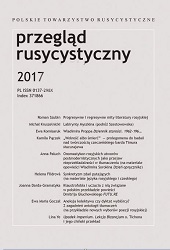MODERN TRENDS IN MOTIVATIONS FOR LEARNING RUSSIAN AS A FOREIGN LANGUAGE (INTERNATIONAL RESEARCH DATA FROM 2010–2014)
MODERN TRENDS IN MOTIVATIONS FOR LEARNING RUSSIAN AS A FOREIGN LANGUAGE (INTERNATIONAL RESEARCH DATA FROM 2010–2014)
Author(s): Natalia GetmanenkoSubject(s): Language studies, Foreign languages learning, Eastern Slavic Languages
Published by: Polskie Towarzystwo Rusycytyczne
Summary/Abstract: One of the primary tasks for a teacher of a foreign language is building strong motivational skills within her students. Maintaining proper motivation amongst students reinforces a high incentive to learn the language in question, not only while the student is attending school, but also later in life. This thesis is currently under discussion in academic forums in Europe, Asia, and North America. For example, a college in the US reports the following lamentable statistics: after the first semester [of studying Russian], interest in continuing to learn the language is reduced by 40%. The number of second-year students is significantly reduced, and by the third and fourth year, the number of students who are studying Russian as a foreign language is a mere 20%; a large number of these students are those with Russian roots — new generation “heritage speakers” (Polinsky, Kagan, 2007). As interest in studying Russian dissipates for a large number of students, so too does the students’ motivation to learn the language. Master’s programs are partially filled, and few students go on to pursue post-graduate education. A sample survey among students of the US and Canada showed that the primary reason for these effects is the reduction of motivation due to the opinion of students that Russian is “a difficult language with a complicated grammar,” that “the sphere of utility of Russian is shrinking,”1 and therefore that “it is inconvenient to use [Russian] for future professions.”2 Preceding pedagogy, there exists a complex, methodological task — to convince students that Russian grammar is not more complicated than the grammar of any other language (e.g. Chinese, Arabic, Finnish, etc.), and that the cultivation of a language system is beneficial not only to the actual using of the language, but also to the intellectual development of the student in general. Two vital tasks for teachers of foreign languages are as follows: 1) to understand which stage of studying Russian as a foreign language ought to actively support students’ motivation, and 2) to adjust (if necessary) the learning process in order to maintain a high level of motivation.
Journal: Przegląd Rusycystyczny
- Issue Year: 2017
- Issue No: 158
- Page Range: 150-170
- Page Count: 21
- Language: English

